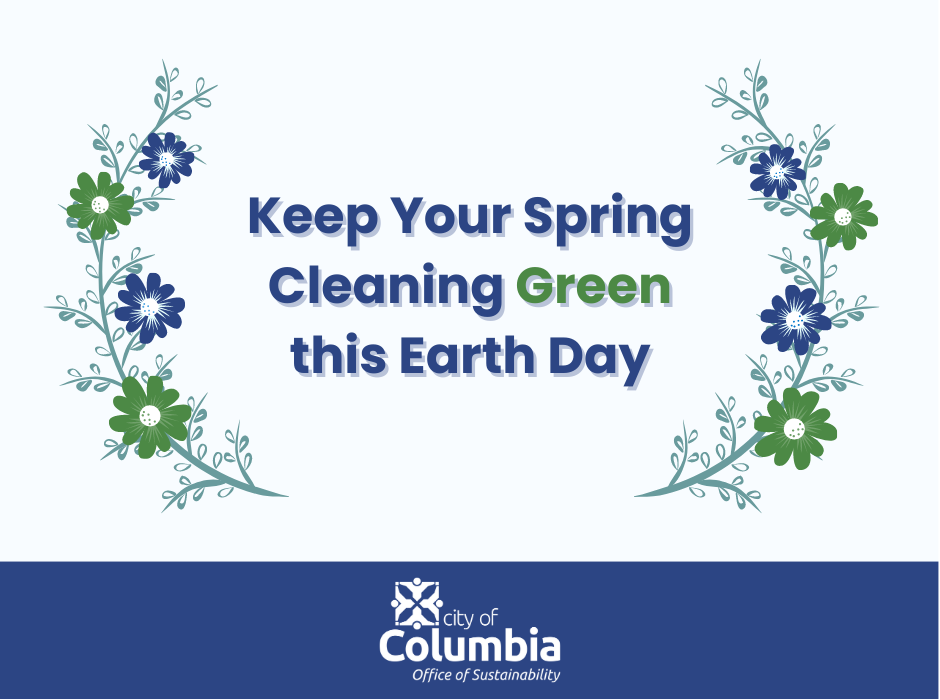Spring is in the air in Columbia, and that means two things: it’s the season for spring-cleaning, and Earth Day is right around the corner. Our city’s Climate Action and Adaptation Plan (CAAP) is working to ensure our community is more sustainable and environmentally friendly every day — but our work isn’t done alone. Individual action makes a serious difference when it comes to fighting climate change and ensuring a clean and safe environment for our future.
This year, whether you’re using spring cleaning to deep clean your home, declutter your office, or freshen up your spaces, celebrate Earth Day by considering the environmental impacts of your cleaning habits. We’ve collected five of our top eco-friendly tips that make sure we keep both our spaces and our planet clean (on Earth Day, and every other day, too!).
It can be overwhelming trying to pick products for all of the different cleaning tasks in your home. Unfortunately, many conventional cleaning products contain chemicals that can harm both the environment and health over time.
If you’re interested in making safer choices while you shop, the Environmental Protection Agency (EPA) has developed an easy-to-use database to check out the products you have in your home and find safer options. If you don’t have time to buy new products, many household cleaners can be made at home using natural ingredients that you may already have in your pantry like vinegar, baking soda, and lemon juice. Not only are these convenient, they’re often cost-effective, and keep your home and our environment free of toxic ingredients.
Spring cleaning is also an excellent opportunity to declutter your home and finally sort out those boxes of items that you simply don’t use any more. Instead of tossing things you no longer need into the trash this month, consider finding them new homes and uses. Columbia is full of local charities and second-hand stores that are always taking donations: try local Salvation Army or Goodwill branches for donating clothes, toys, and shoes, and check out Love Columbia for donations like household essentials and furniture. This organization is also looking for cleaning supplies – so if you’re slimming down the products in your cabinet, consider donating some!
Finding new uses for some items can also help reduce our impact on the planet. Stained or torn clothing can make excellent rags to use for other cleaning tasks, and items like old jars, bottles, and boxes can be upcycled into all kinds of useful or decorative pieces around the home.
Got some items that just can’t be used again? That’s okay too – some things are truly ready to go. Just make sure to stay in-the-know and use the CoMo Trash and Recycle Tool to find out if items you’re throwing away can be recycled, or try attending a free composting workshop to see how some waste can turn environmentally-friendly with the right steps.
Did you know that 37% of the waste we send to the landfill is actually compostable – and another 32% is recyclable? We can do ourselves, our environment (and our economy!) a favor by cleaning up our waste stream and minimizing landfilled waste.
When going through the cleaning motions, it can be easy to reach for that roll of paper towels as an easy and go-to options. But switching to non-disposable supplies is easier than it may seem at first: rags, towels, and microfiber cloths are more absorbent than paper towels — plus, they can easily be thrown in the wash and reused time and time again.
You don’t need to invest in fancy paper towel alternatives to change your routine. Old t-shirts, hand towels, and even blankets or sheets can find new uses as a part of your revamped spring-cleaning habits.
When talking about sustainable cleaning, it’s not just about the products in our cabinets. Appliances like vacuum cleaners, washing machines, and dryers can become easy-to-forget culprits of overusing energy and water in the home. Outside of standard efforts to save water and reduce energy use, replacing older appliances with energy-efficient options can both reduce your carbon footprint and save money on energy bills in the long run.
Curious to see what kind of energy your appliances are using? Check out an energy appliance calculator to see where your home currently stands, or look into the Department of Energy’s comprehensive articles about decreasing water and energy use from home appliances.
In the process of clearing out your home or office space this season, you may come across hazardous materials like batteries, paint, and cleaning chemicals. These materials should never be thrown away in the trash, as they can be dangerous to wildlife and pollute our water and air. Instead, check the Columbia waste management page to see what materials are considered hazardous — and how to dispose of those materials safely.
Search this interactive map for where you can drop off hazardous waste (and see recycling, yard waste, and compost drop offs!).
--
By adopting these environmentally-friendly tips, you can make this season’s spring-cleaning routine a more sustainable one. Remember, every little action counts, and together we can make a big difference in creating a safe and sustainable future for Columbia.
Want to keep the Earth Day celebrations going? Check out ways to take action in the “Be Part of the Solution” page of our sustainability dashboard.
Previous Post
Sustainable Transportation in CoMo
Next Post
Fall In LOVE with These 4 City Sustainability Programs






